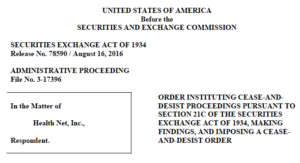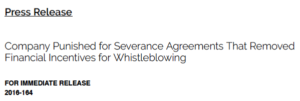Health Net Fined For Forcing Employees To Waive SEC Whistleblower Awards
On August 16, 2016, the U.S. Securities and Exchange Commission (“SEC”) entered an order against Health Net, Inc. (“Health Net”) for using language in its severance agreements that required departing employees to waive SEC whistleblower awards as a condition of receiving their severance benefits. The Commission made it clear that forcing employees to give up their rights to awards, as Health Net did, violates SEC whistleblower protections.Health Net’s Original Severance Agreement Required That Employees Waive SEC Whistleblower Awards
Section 21F of the Securities Exchange Act of 1934 is the law pertaining to the SEC whistleblower program. The original version of Health Net’s severance agreement specifically targeted the SEC whistleblower program by requiring departing employees to waive their “right to file an application for award for original information submitted pursuant to Section 21F of the Securities Exchange Act of 1934”. A different paragraph of the severance agreement expanded this prohibition to whistleblower awards from any government agency:… by signing this Release, Employee waives any right to bring a lawsuit against the Company, and waives any right to any individual monetary recovery in any such proceeding or lawsuit or in any proceeding brought based on any communication by Employee to any federal, state, or local government agency or department.
According to the SEC’s Order against Health Net, over a two-year period, approximately 600 employees signed this version of the severance agreement requiring them to waive SEC whistleblower awards.
The SEC Order
Health Net’s Amended Severance Agreement
Subsequently, Health Net amended its severance agreement to remove the language specifically targeting Section 21F (the SEC whistleblower statute). However, Health Net retained restrictions “that removed the financial incentive for its former employees who executed that agreement to communicate with Commission staff concerning possible securities law violations at Health Net”. Health Net’s amended severance agreement included the following provision:by signing this Release, Employee, to the maximum extent permitted by law … waives any right to individual monetary recovery … in any proceeding brought based on any communication by Employee to any federal, state or local government agency or department. (Ellipses in original.)
The SEC Whistleblower Protections Of Rule 21F-17(a)
The Order noted that the U.S. Congress considered SEC whistleblower awards to be “a critical component” of the SEC whistleblower program. In addition, the SEC whistleblower rules contain the following prohibition, quoted in the Order (Rule 21F-17(a)):No person may take any action to impede an individual from communicating directly with the Commission staff about a possible securities law violation, including enforcing, or threatening to enforce, a confidentiality agreement … with respect to such communication.
The SEC Imposed Sanctions Even Though It Had No Evidence That Health Net Tried To Enforce The Agreements
According to the Order, the SEC was not aware of any instance in which a former employee who signed the severance agreement “did not communicate directly with Commission staff about potential securities law violations”. The Order also acknowledged that the SEC was unaware of any instance in which Health Net “took action to enforce those provisions or otherwise prevent such communications”. Nevertheless, the SEC determined that both versions of Health Net’s severance agreements:… directly targeted the SEC’s whistleblower program by removing critically important financial incentives that are intended to encourage persons to communicate directly with the Commission staff about possible securities law violations. Such restrictions on accepting financial awards for providing information regarding possible securities law violations to the Commission undermine the purpose of Section 21F and Rule 21F-17(a), which is to ‘encourag[e] individuals to report to the Commission,’ … and violate Rule 21F-17(a) by impeding individuals from communicating directly with Commission staff about possible securities law violations. (Citation omitted.)
An Associate Director of the SEC’s Division of Enforcement explained in a press release that:Financial incentives in the form of whistleblower awards, as Congress recognized, are integral to promoting whistleblowing to the Commission … Health Net used its severance agreements with departing employees to strip away those financial incentives, directly targeting the Commission’s whistleblower program.
As a result, the SEC found that Health Net violated the protections contained in Rule 21F-17 by pressuring employees to waive SEC whistleblower awards.
The SEC’s press release
The Sanctions Imposed On Health Net
For trying to compel departing employees to waive SEC whistleblower awards, the SEC fined Health Net $340,000. In addition, among other things, the Order required Health Net to make reasonable efforts to:(1) contact its former employees who had signed the severance agreements;
(2) give them an Internet link to the Order; and
(3) provide them with “a statement that Health Net does not prohibit former employees from seeking and obtaining a whistleblower award from the Securities and Exchange Commission pursuant to Section 21F of the Exchange Act”.
Additional Information
For additional information about the prohibition against requiring employees to waive SEC whistleblower awards, click on the links below:- The SEC’s Order in the Health Net case. (External link to the SEC’s website.)
- The SEC’s Press Release about the Health Net case. (External link to the SEC’s website.)
- Article about the Health Net case. (Note: external link to The Pickholz Law Offices website.)







